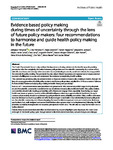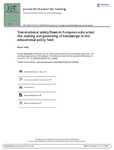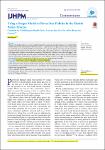Evidence based policy making during times of uncertainty through the lens of future policy makers: four recommendations to harmonise and guide health policy making in the future
Date
2022-12Author
Subject
Metadata
Show full item recordAbstract
<jats:title>Abstract</jats:title><jats:p>The Covid-19 pandemic has not only outlined the importance of using evidence in the healthcare policy making process but also the complexity that exists between policymakers and the scientific community. As a matter of fact, scientific data is just one of many other concurrent factors, including economic, social and cultural, that may provide the rationale for policy making. The pandemic has also raised citizens’ awareness and represented an unprecedented moment of willingness to access and understand the evidence underpinning health policies.</jats:p><jats:p>This commentary provides policy recommendations to improve evidence-based policy making in health, through the lens of a young generation of public policy students and future policymakers, enrolled in a 24-hour course at Sciences Po Paris entitled “Evidence-based policy-making in health: theory and practice(s)”.</jats:p><jats:p>Four out of 11 recommendations were prioritised and presented in this commentary which target both policymakers and the scientific community to make better use of evidence-based policy making in health. First, policy makers and scientists should build trusting partnerships with citizens and engage them, especially those facing our target health care issues or systems. Second, while artificial intelligence raises new opportunities in healthcare, its use in contexts of uncertainty should be addressed by policymakers in terms of liability and ethics. Third, conflicts of interest must be disclosed as much as possible and effectively managed to (re) build a trust relationship between policymakers, the scientific community and citizens, implying the need for risk management tools and cross border disclosure mechanisms. Last, well-designed and secure health information systems need to be implemented, following the FAIR (findable, accessible, interoperable and reusable) principles for health data. This will take us a step further from data to ‘policy wisdom’.</jats:p><jats:p>Overall, these recommendations identified and formulated by students highlight some key issues that need to be rethought in the health policy cycle through elements like institutional incentives, cultural changes and dialogue between policy makers and the scientific community. This input from a younger generation of students highlights the importance of making the conversation on evidence-based policy making in health accessible to all generations and backgrounds.</jats:p>
Collections
Publisher
Place of Publication
Journal
Volume
Issue
Pagination
Number
Recommended, similar items
The following license files are associated with this item:
Related items
Showing items related by title, author, creator and subject.
-
Transnational policy flows in European education: the making and governing of knowledge in the educational policy field
Kelly, Peter (Informa UK Limited, 2016-10-19) -
Crisis and Change in European Union Foreign Policy: A Framework of EU Foreign Policy Change
Cladi, Lorenzo (2022-07-20) -
Using a Stages Model to Reveal the Politics in the Health Policy Process Comment on "Modelling the Health Policy Process: One Size Fits All or Horses for Courses?"
Sheaff, Rod (Maad Rayan Publishing CompanyIran, 2023-06-20)Models of the health policy process have largely developed in isolation from political studies more widely. Of the models which Powell and Mannion’s editorial considers, a stages model of the policy process offers a ...




